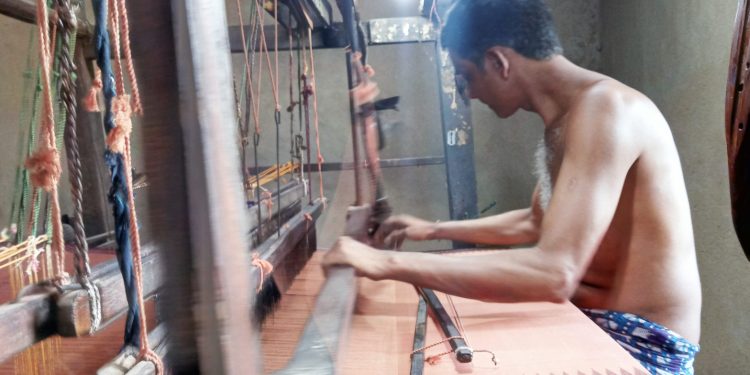Lathor: The government has been pushing the handloom sector by way of providing skill upgradation training and financial assistance to weavers of western Odisha. However, scores of such artisans are deprived of facilities and have been leading a miserable life in Bolangir, a report said.
The traditional handloom and textile designs of Odisha enjoy acceptability worldwide. Sambalpuri sarees are acclaimed by many for its distinctive patterns and beautiful motifs. Sambalpuri saree is produced in the areas like Bolangir, Sonepur, Sambalpur, Bargarh and Boudh districts.
However, many weavers feel they need more than just awards and felicitations. They need right kind of patronage in terms of market, skill development training and financial support.
Our correspondent talked to a few weavers family of Bolangir district on the handloom sector.
An elderly weaver said, “If we weavers are supplied with raw materials at lower price and trained with new technology through skill upgradation, the problem can be resolved to some great extent.”
40-year old Basanta Meher, a weaver of Debrimunda village in Turkela block, agreed to the elderly weaver. He observed, “Some skill development programmes are conducted in pen and paper only. But when it comes to reality, we have nothing of that sort of training.”
According to Meher, the technology used in southern states for weaving handloom clothes, one person can do the work which will need at least two persons with our technology. However, since all our works are done manually we can produce only four pieces of clothes at one time. If our weavers are financially assisted to buy such machines we can also produce more clothes in less time,” he added.
Another weaver Surya Kumar Meher of the village said “I have created a number of motifs using different natural elements like flowers, sun, different plants etc. Even, I can create a new customized motif as per the need of a customer. However, we don’t get enough remuneration for a customized work and so stick to the existing one.”
Another weaver Sarat of the same village said there are many schemes sponsored both by the central government and state government but those are unreachable to the real weaver families.“My father is a weaver and he is too old to work. I have heard elderly weavers are entitled to some kind of pensions. If my father is given pension in lieu of his creative works as a weaver, it would be a great help to our family,” Sarat added.
Both central and state governments have implemented various schemes for the handloom weaver families including skill upgradation training, insurance for the weavers and pension but these are unreachable to the weavers due to the apathy of the government officials.
Scores of weavers are interested to take part in skill upgradation training being provided by the government. However, they don’t get the scope at villages due to apathetic attitude of the administration.
Handloom weavers are entitled to receive training with Jacquard introduction that entails weaving fabrics of extraordinary designs.
With Jalla & Dobby technique, semi-skilled weavers are trained in weaving intricate designs for production of value-added products. The implementation will be made in non-tie dye areas.
Weaving with tie and dye is a typical traditional process in the sector by which motifs are made from yarns. This skill is limited to important handloom pockets like Bargarh, Sonepur, Nuapatna & Boudh. Therefore, it is necessary for providing training to those weavers who are not acquainted with tie and dye method of weaving.
PNN






































